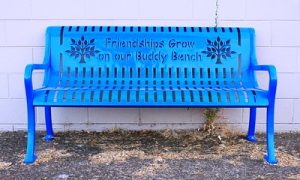The Power of Questions
For reasons unknown to me, I have been struggling to come up with a compelling topic of reflection on The Power of Stories. I think we know inherently how powerful stories can be. And that there are so many kinds of stories to tell – long, short, visual, written, oral, and even just the story of our day. In pondering the elements of the readings, videos, and explorations of recent weeks there are a few items that keep popping up in my thoughts.
Get to Know Your Neighbor – Anythink Library
I am entranced by this wonderful idea we learned about in Module 8 of setting up a sofa in a public space and inviting strangers to sit down, draw a question out of a bowl, and start learning the story of the person sitting next to them. People of all ages can learn something new and share their stories in a safe and positive manner. And the follow-up questions the participants had were so engaging and kept the conversations flowing! I was especially taken by the young man learning who Frida Kahlo was and then asked his neighbor if she was an artist too. But then how can you forget the young boy talking about the penguins?

This project reminds me of buddy benches that are used at some schools to promote inclusion and foster friendships. If you haven’t heard of them before, buddy benches are specific benches that are placed in school playgrounds where a student can choose to sit if they are feeling lonely or in need of company. Ideally, other students will notice and join the child for a conversation or invite them to play. Imagine a child who is feeling lonely and wants to tell someone the story of their day and doesn’t know how. They sit on the bench which is a physical cue that is telling their story of the moment. Another student sees them, sits down, and the story moves forward.

Rick Obst – https://www.flickr.com/photos/discoveroregon/51353857232/
Narrative Inquiry (Minute 8:40 in Stephens Lecture)
Michael Stephens talks about the research methodology of narrative inquiry in his video lecture The Power of Stories. Discussing the use of narrative inquiry methods to survey librarians or library patrons, Stephens emphasizes that we can learn more by asking open-ended questions that don’t relate specifically to libraries rather than asking specific questions that might lead the patron to provide answers they think you are looking for. This technique can be used for any interview or survey as an excellent way to facilitate robust storytelling whether for professional or for personal research.
If you are interested in learning more about the origins of narrative inquiry and how it relates to storytelling, you might enjoy watching this video of Jean Clandinin, Professor Emeritus at the University of Alberta, one of the early developers of the methodology.
I first learned about StoryCorps from my sister. She teaches English for speakers of other languages for adults in Virginia and uses StoryCorps videos in her curriculum. Her students come from a variety of countries with diverse backgrounds and educational goals. The StoryCorps videos help her students learn English, tell stories, and find some common ground in the classroom.
My sister also discovered a storytelling company called Storyworth. One can purchase a yearly subscription to this website to help you or someone else tell their story. Each week, a story prompt is sent to the subscriber. At the end of the year, the questions and answers are compiled into a physical book containing that subscriber’s story. Users can answer the questions as they are presented, choose a different question, or write their own question.
My siblings and I agreed that we should purchase a subscription for our parents, who willingly agreed to participate. The project ended up being a lot of fun and revealed interesting tidbits of family history and personal reflections that we might not have known if certain questions hadn’t been asked. For example, my father grew up in Boston as a first generation Italian American. His mother was a homemaker and his father worked in a shoe factory. I never asked him whether his family took vacations. Storyworth asked that question. It turns out that once a year, his father would hire a driver to take them to the beach for the day. From this one question, I learned that his family didn’t own a car and that a day at the beach was a big event in his youth.
Which leads me to what I think all of these elements have in common – the questions we ask about people whose stories are being told are of utmost importance. Asking unexpected questions might reveal an unexpected answer. Asking questions that aren’t binary will reveal more useful information than a simple yes or no answer. It’s not really rocket science but I do think that it can be hard to remember sometimes.

People want to tell their stories every day, even if they aren’t recorded. So what are some good questions that we can ask that will prompt people to tell a compelling story? I’ve compiled a list of some questions that I think might make for some interesting sofa or dinner party conversations.
From Storyworth:
- What were your grandparents like?
- Tell us about one of the best days you can remember?
- What is one of your favorite holiday memories?
- What habit do many people have that you find very strange?
- What is your favorite joke?
- What is the first major news story you can remember living through as a child?
- What are some of your favorite smells?
From StoryCorps:
- Do you remember any songs that you used to sing to your children?
- Can you tell me about a moment when a person’s kindness made a difference in your life?
- If you could talk to a younger version of yourself, what would you say?
- What makes us such good friends?
- How would you like to be remembered?
From Conversationstartersworld.com
- What life hacks have you found to be particularly effective?
- What is the most calming image you can conjure up in your mind?
- What would happen during the best day imaginable?
- How would you prepare for a zombie apocalypse?
Because I work in a middle school library, here are a few questions that I think my students would enjoy answering.
- What’s your favorite manga series?
- DC or Marvel?
- What’s your superpower?
- Would you rather be covered in fur or scales? (From conversationstartersworld.com)
And from my own experience, I like to end any sort of interview with the following question:
- What question should I be asking you that I haven’t asked yet?
References
Anythink Libraries. (2016). Get to know your neighbor [Video]. YouTube: https://www.youtube.com/watch?v=rzLI-aqFzDQ
Castellanos, S. (2023, September 27). Kindergarten buddy benches. Edutopia.org. https://www.edutopia.org/article/kindergarten-buddy-benches/
Clandinin, J. (Academic). (2018). Jean Clandinin discusses narrative inquiry [Video]. Sage Research Methods. https://doi.org/10.4135/9781526432490
Conversation Starters World. (n.d.). https://conversationstartersworld.com/
Stephens, M. (2022). Hyperlinked library power of stories [Video lecture]. https://sjsu-ischool.hosted.panopto.com/Panopto/Pages/Viewer.aspx?id=25a905bc-6739-4f68-afea-af10013f32fb
StoryCorps. (n.d.). https://storycorps.org/
Storyworth. (n.d). Everyone has a story worth sharing. https://welcome.storyworth.com/
10 Comments
Jeanna
I love the idea of giving prompts like this to parents or grandparents — getting the ball rolling, especially if you have a talkative one who wants to share, but even if you have reticent ones who may still want to be seen. Imagine collecting all your aunts and uncles stories together to pass to their grandchildren before they start to pass or dimentia starts to set in. We tend to think of this in terms of the elderly, but we’re all going to get there someday — might as well start the project now.
Maggie Rogers
Thanks @jeanna! I thought the prompts from Storyworth were really interesting and provided a useful framework for participants to use to gather their thoughts. What I didn’t put in my initial reflection is that we also purchased a subscription for my in-laws as the same time. Although they are both great storytellers who love to share family history, they didn’t really like getting a weekly email asking for a story. We ended up interviewing them and finishing the book on our own with their family stories. We also asked all the siblings and grandchildren to write a story/memory or a tribute to the grandparents. It ended up still serving the same purpose of collecting stories but just not quite as seamlessly as we hoped!
Michael Stephens
@maggierogers oh, this is absolutely wonderful. I am going to save this because you pulled out such interesting questions from all of those references. Thanks for this. I also really like the picture of the bench.
Maggie Rogers
Thanks @michael. There are so many good questions out there it was hard to pick!
Michael Stephens
@maggierogers Absolutely!
Mary Joy (MJ)
Hi, Maggie! I wanted to echo the value of Storyworth – what a fantastic website! I remember all the way back in high school, as part of one of my English classes we had to contribute a recording to Storyworth and I had such a fun time creating and listening to other classmates’ contributions. The question “What is the first major new story you can remember living through as a child?” is such a fascinating and powerful one, and I think does a lot of work to help engage with people in a different and challenging way and to gauge where people are in their lives beyond just age. I was only two years old at the time, but I do vaguely remember when 9/11 happened by sheer virtue of the fact that we were on vacation in Florida with my grandparents and weren’t sure how we were going to get home to California when the whole country froze from the trauma. Answering that question opens up so many others – “Tell me more about vacationing in Florida,” or, “Tell me more more about your grandparents,” or, “So, how did you end up getting home?” Thank you for this wonderful post!
Maggie Rogers
Thanks MJ! I also think that question is one of the most powerful questions with so many layers. My first news memory is also from a vacation although much longer ago than yours. 🙂 It was 1974 and we were living in Germany (my Dad was in the Army). We were returning home from a road trip and the first thing we did when we arrived back to the Army base, even before we went home, was to go to the Post Exchange and buy a newspaper. The big news of the day was the President Nixon had resigned. So many follow-up questions that I should probably remember to ask my Mom before I forget. Thanks so much for your response and reminder that I have more stories to gather.
Denise Jessie
I love the idea of creating an autobiography of sorts by answering questions. Simple questions can trigger great memories. I lost my mother a few month ago, and quite often, I think of a question I want to ask, and then realize that opportunity is gone. How I wish she had participated in something like Storyworth or StoryCorps to keep her memories alive. Thank you for sharing.
Maggie Rogers
Hi Denise. I am so sorry to learn about the loss of your mother and offer you my sincere condolences. I’m happy to know that my post might guide you to a new tool to capture your own stories and perhaps remember some of your mother’s as well. Wishing you peace and fond memories!
Denise Jessie
@maggierogers Thank you Maggie.